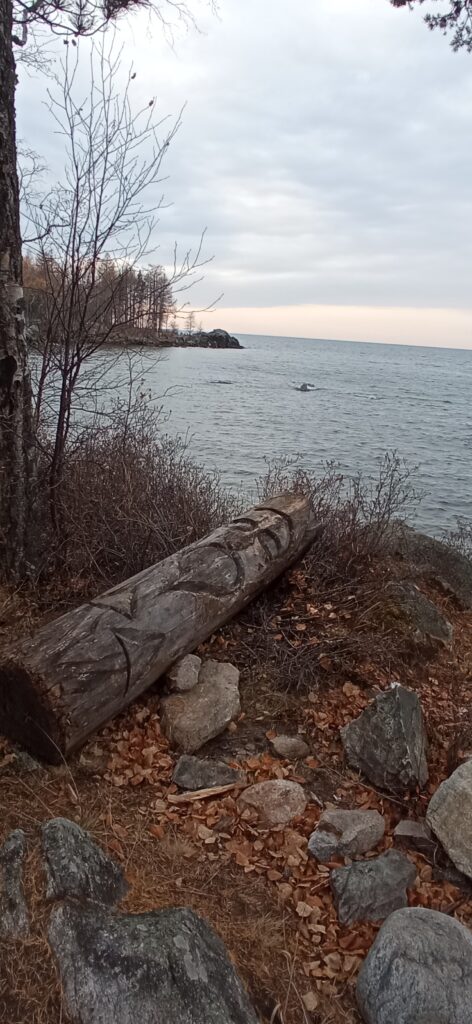
Officials in Russia’s Irkutsk region in southeastern Siberia have publicly denounced activists seeking to block a controversial bill that would ease logging restrictions along the shores of Lake Baikal.
In an open letter, 34 regional officials, including six mayors, accused environmental activists of waging a cyberbullying campaign and inciting “inter-social conflicts between the peoples of Baikal and the rest of Russia,” according to excerpts from the letter published by Govorit NeMoskva.
The open letter, which was sent to local media outlets, singled out activists Vitaliy Ryabtsev and Lyubov Alikina as the chief instigators of an alleged cyberbullying campaign against supporters of the bill who live on Baikal’s shores.
The letter’s authors called on President Vladimir Putin, the Federal Security Bureau and the Prosecutor General’s Office to inspect activists’ online publications and social media comments for traces of “hatred of Baikal’s residents and the country’s leadership.”
In November 2023, Alikina published an official letter from the Prosecutor General’s Office which stated that measures outlined in the new bill could indeed harm Baikal’s unique ecosystem while yielding no direct benefits to local residents.
UNESCO’s World Heritage Committee signaled earlier this year that adaptation of the controversial bill could result in Lake Baikal being added to its World Heritage in Danger list. In mid-December IUCN and UNESCO dispatched to Lake Baikal a 5-day reactive monitoring mission to document current state of conservation and development proposals, including the infamous amendments to the Law of Protection of the Lake Baikal. The final report to UNESCO will be prepared by March 2024. Therefore, this assault on still vocal local defenders of Baikal is not just a coincidence.
The campaign against Alikina and Ryabtsev is likely orchestrated by Ms. Sayenko, an Irkutsk lawyer, who has been involved in protecting rights of owners of properties illegally built on the lakeshore. She has been working as assistant to the Parliament member Mr. Nikolayev, who coordinated legislative initiatives to weaken legislation on Lake Baikal Protection. In previous months she launched legal action against a media outlet, which quoted Vitaly Ryabtsev’s critique of her activities. The local courts (unsurprisingly) took Ms. Sayenko’s side and ruled that published information was “false”. Current letter logically builds on that assault trying to bring activists under criminal persecution for “spreading hatred against certain social groups”(article 282 of the Russian Criminal Code), which one of the murkiest articles of the Code, often used to sentence activists and journalists.
Last year, just two weeks after Greenpeace Russia sounded the alarm about the catastrophic consequences the proposed law would have for Baikal, another Parliament member from Irkutsk, Mr.Yakubovsky sought to silence the organization and called on Russia’s Justice Ministry to investigate it for compliance with Russia’s “foreign agent” law. Though Greenpeace avoided designation as a “foreign agent,” Russian authorities outlawed the group entirely in May with an “undesirable” label — a move also set in motion by Yakubovsky.
Following the dismantling of all large international environmental groups operating in the country, Russia’s lower house of parliament in July 2023 approved amendments to the country’s law on the protection of Lake Baikal in their first reading, which lawmakers say are aimed at developing basic infrastructure in the many remote towns and villages on the lake.
Those fresh amendments to the country’s law on the protection of Lake Baikal — a UNESCO World Heritage site — seek to permit clearcut logging to accommodate new municipal and tourist infrastructure around settlements and in special economic zones (SEZ). For example in “Gates of Baikal” SEZ forest clearing may be allowed on as many as 75 plots of shoreland with a combined area of 762 hectares.
While the bill’s backers say it will allow for a long-overdue development of basic infrastructure in the many remote towns and villages on the lake, ecologists believe it would pave the way for mass commercial wood harvesting and the building of outsized tourism infrastructure. Among the “positive” features of the law touted by its backers are provisions for … “compensating” for each felled tree by planting five others in its place.
“The area around Baikal has grasslands, the slopes of the steppe, forests and territories developed by humans…Where in this equation is the room to plant one tree for every five? Does it mean planting trees in the steppe, or what?” said in an interview to Moscow Times environmental activist Eugene Simonov, a coordinator of the Rivers without Boundaries international coalition. Time has shown that he was partly wrong, when worrying about planting trees in grasslands….
In early December 20023 the Head of the Office of the national project “Preservation of Lake Baikal” Maxim Stafeev has revealed that his reasoning behind allowing forest clearcuts is based on the need to use 3.7 billion rubles earmarked for restoration of forests on Lake Baikal in the national project’s budget. To carry out the work, it is necessary to adopt a law allowing clearcutting, because otherwise there will be no space to plant new trees…
Due to many protests from prominent experts, he version of the law amendments that passed the first hearings does not include many items from the wish-list of its proponents in the Parliament and business-interest groups which are behind them. They obviously hope to include more items weakening Baikal legislation right before the draft law comes to the second hearings. The fact that after quick adoption in the first hearings, the process of law amendment has slowed down is partly due to active opposition from activists and some Parliament members, and partly due to desire not to make such drastic steps before the UNESCO reactive monitoring mission makes its conclusions.
The new assault on local conservationists is, likely, a sign that proponents of accelerated development on Lake Baikal shores are preparing to launch their final attempt to amend the law early next year.
Sources: Moscow Times and the RwB own sources.


